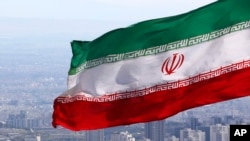Iranian state TV said Wednesday that the country's paramilitary Revolutionary Guard has accused the deputy ambassador of the United Kingdom and other foreigners in the country of espionage and taking soil samples from prohibited military zones.
The country's state-run IRNA news agency reported that the foreigners had been arrested but did not say when. The U.K. Foreign Office swiftly denied that its diplomat was arrested, calling the report "completely false."
Iran's state TV ran footage purporting to show the foreigners collecting samples from the ground while under drone surveillance.
The storm of accusations follows escalating tensions over an increase in Tehran's arrests of foreigners and a rapid advancement of its nuclear work, while talks to revive the landmark 2015 nuclear accord remain at a standstill. Iran has detained a number of Europeans in recent months, including two French citizens and a Swedish tourist, as it seeks to gain leverage in negotiations.
The report also comes after Iran, in a rare move, replaced the Revolutionary Guard's long-standing intelligence chief.
News outlets reported the deputy head of mission at the British Embassy, Giles Whitaker, and other foreigners faced spying charges after visiting various forbidden zones in the country while the Guard was carrying out missile tests.
The semiofficial Fars news agency, believed to be close to the Guard, claimed Whitaker was expelled from the area after offering authorities an apology.
The accusations in Iranian media came as the British public was transfixed by the political fortunes of Prime Minister Boris Johnson, who faces growing pressure to step down after defections from his Cabinet.
State TV broadcast a photo montage apparently showing Whitaker touring the southwestern desert collecting soil samples against the backdrop of eerie music.
"Even though there were signs in that area saying this was a forbidden area, he went further and took a sample and took a picture," the narrator said. "Intelligence agencies say that these people often pose as tourists but are looking for military and missile sites to identify equipment and ammunition."
Iranian media also identified Maciej Walczak, a Polish scientist at Copernicus University in Poland, as among the accused foreigners. It similarly said he took samples of soil, water and salt from a forbidden area during a missile test in the country's south.
The report added that the Guard's intelligence wing detained the husband of Austria's cultural attaché in Iran after he took soil samples in the country's northeast.
Iran has in the past arrested dual nationals and those with Western ties, often on widely criticized espionage charges, and used them as bargaining chips in talks over other issues, such as nuclear negotiations. Tehran denies using detainees to further its political aims.
Talks to revive Tehran's tattered nuclear deal with world powers have stalled for months. A recent effort to break the deadlock between U.S. and Iranian negotiators ended without making progress in Doha last week.
The U.S. special envoy for Iran, Robert Malley, described the latest talks in Qatar as "more than a little bit of a wasted occasion."
"They have and, including in Doha, added demands that I think anyone looking at this would be viewed as having nothing to do with the nuclear deal, things that they've wanted in the past," Malley said in an interview with National Public Radio on Tuesday, undercutting Tehran's more upbeat assessments.
He added that the U.S. is working simultaneously to secure the release of four Americans detained in Iran.
"They've been used as pawns,” he said. “But we are looking at steps that we could take that would facilitate their return in the shortest time possible."
Meanwhile, as a shadow war between Israel and Iran has escalated in Tehran and across the Middle East, Iran announced last month that the head of the Guard's intelligence arm, Hossein Taeb, had been replaced by Gen. Mohammad Kazemi, the former head of the Guard's security department.
The surprise move followed the deaths of several Guard officers in recent weeks.




